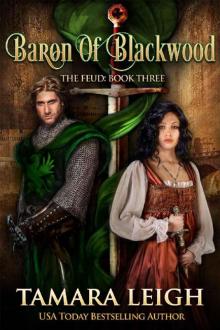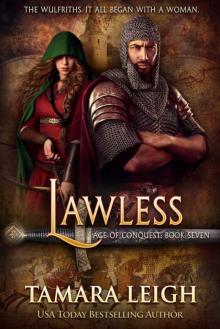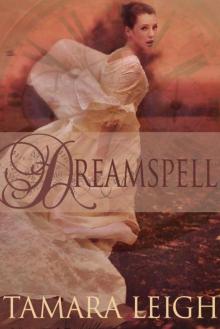- Home
- Tamara Leigh
BOUNDLESS: A Medieval Romance (AGE OF CONQUEST Book 6)
BOUNDLESS: A Medieval Romance (AGE OF CONQUEST Book 6) Read online
BOUNDLESS
Book Six: Age of Conquest
Tamara Leigh
Tamara Leigh
THE WULFRITHS. IT ALL BEGAN WITH A WOMAN.
A battle. A crown. The conqueror. The conquered. Medieval England—forever changed by the Battle of Hastings. And the rise of the formidable Wulfriths.
DECEIT WRAPPED IN SOMETHING SWEET
After aiding the English resistance who once more fail to reclaim their country from the invaders, Lady Marguerite returns home to Scotland in the aftermath of William the Conqueror’s harrying of the North—and does not come alone. Accompanying the Sparrow of King Malcolm’s Court is a warrior mistakenly believed her enemy, the price for which may be his irreparable loss of sight. Burdened by having laid the trap for a man she regrets not recognizing sooner, and strangely drawn to him, she determines she will be the one to tend this Norman. But that is possible only if he does not learn she is responsible for what could strip the warrior from him. When her deception is unveiled, will he reject what he has come to feel for her? When he leaves, will he take her heart with him?
A WARRIOR CAST IN SHADOWS DEEP
Gifted with a sense beyond the natural, which has made life seem more a sport than a battle, Sir Theriot D’Argent counts himself favored by God—until the night he aids villagers attacked by his fellow Normans and a good deed turns tragic. Stricken blind, his world reduced to shadows amid clouded light, he finds himself a prisoner of the King of Scotland and in the care of a lady whose voice and touch disturb as much as the belief her secrets are not hers alone. Will his sight be restored? Or is this divine punishment for aiding in England’s conquest? And what is he to do with feelings for the one whose trap ensnared him? Even were it possible to forgive her for a life cruelly altered, he would be a burden—and a danger for being unable to protect the lady from her murderous kin.
From Northern England to the Scotland of King Malcolm, the tale of Sir Theriot D’Argent and Lady Marguerite unfolds in the sixth book in the AGE OF CONQUEST series revealing the origins of the Wulfriths of the bestselling AGE OF FAITH series. Watch for LAWLESS: Book Seven releasing Spring 2021.
For new releases and special promotions, subscribe to Tamara Leigh’s mailing list: www.tamaraleigh.com
BOUNDLESS: Book Six (Age of Conquest) Copyright © 2021 by Tammy Schmanski, P.O. Box 1298 Goodlettsville, TN 37070 [email protected]
This novel is a work of fiction. Names, characters, places, incidents, and dialogues are either the product of the author’s imagination or are used fictitiously. Any resemblance to actual events, locales, organizations, or persons, living or dead, is entirely coincidental and beyond the intent of the author.
All rights reserved. This book is a copyrighted work and no part of it may be reproduced, stored, or transmitted in any form or by any means (electronic, mechanical, photographic, audio recording, or any information storage and retrieval system) without permission in writing from the author. The scanning, uploading, and distribution of this book via the Internet or any other means without the author’s permission is illegal and punishable by law. Thank you for supporting authors’ rights by purchasing only authorized editions.
Cover Design: Ravven
Ebook ISBN-13: 978-1-942326-50-2
Paperback ISBN-13: 978-1-942326-51-9
Contents
Prologue
Chapter 1
Chapter 2
Chapter 3
Chapter 4
Chapter 5
Chapter 6
Chapter 7
Chapter 8
Chapter 9
Chapter 10
Chapter 11
Chapter 12
Chapter 13
Chapter 14
Chapter 15
Chapter 16
Chapter 17
Chapter 18
Chapter 19
Chapter 20
Chapter 21
Chapter 22
Chapter 23
Chapter 24
Chapter 25
Chapter 26
Chapter 27
Chapter 28
Chapter 29
Chapter 30
Chapter 31
Chapter 32
Author’s Note
Lawless Excerpt
Pronunciation Guide
Glossary
Also by Tamara Leigh
About the Author
“For now we see through a glass, darkly; but then face to face: now I know in part; but then shall I know even as also I am known.”
~ 1 Corinthians 13:12 KJV
Prologue
Northumbria, England
Late Summer, 1069
Her mother was dead. A year dead.
Dear Lord, the passing of four seasons! And no word sent nor warning given even this day.
Firming knees threatening to buckle, Marguerite stared at the weathered wood into which her own name was crudely carved and naught else—as if the woman beneath weed-infested earth had been no one’s daughter, sister, wife, and mother.
She told herself it was wrong to hate the three standing with her, and yet it felt right, just as it had a year past when last she was here and the woman who had birthed her looked ten years older than she should.
A sudden chill making her wish for the plaid cloak she had not needed this warm day, silently she lamented, I should have come sooner.
“Dropped the firewood, clutched her chest, and landed on the hearth,” her grandfather said. “Nothing for it but to dig a hole.”
Marguerite gasped, and again when her uncle grunted agreement. “May you die without warning,” he spoke the words cast at those one wished given no time to prepare for death, it believed in the absence of confession and absolution, ever the fallen were separated from God.
“Without warning,” her cousin, Pepin, concurred.
As she struggled against screaming and setting herself at them, something in her head popped. Real or imagined, she did not know. What she knew was she had to leave. Hopefully, when Edgar the Aetheling, who had been granted sanctuary at the Scottish king’s court, returned to England to battle the Normans, he would come through here and—
“Nay, even to think it is evil,” she whispered.
“Do not speak that foul tongue,” Uncle Gerald snapped.
She longed to continue in the language with which she was more familiar than her mother’s, but it would delay her departure and might provoke a clash between her escort and kin.
Marguerite looked to the man who was her grandfather only for having sired her mother. In Norman-French with which he would find fault for an accent tempered by that of the Scots, she said, “We are leaving.”
As she swung away, she sent heavenward, Papa, I have no one now mama is with you and my brothers. I am alone.
Or nearly so. The plump figure center of her escort hastened forward, skirts raised to sooner traverse the last of grass sucked dry of its green.
Cannie could not see the lone grave to which her mistress had been led, but likely she understood the elder Marguerite rested here beyond the fortress raised by her Norman family twenty-five years ago after crossing the channel by invitation of England’s king—the childless Edward whose recent death had thrown wide the door to conquest of his kingdom by Duke William of Normandy.
Though this morn Marguerite had looked forward to sitting with her mother and filling an emptiness far different from this one, now hungry only for the comfort of Cannie’s arms, she ran. Into a nightmare.
Beyond her escort, streaks of dark rain traveled horizontally, then the ten warriors handpicked by the King of Scots
lurched forward.
“Nay!” she screamed.
They fell, and as Cannie looked around, she dropped, an arrow protruding from her back the same as her countrymen—eleven straight, feathered saplings refusing to bend in the breeze.
Marguerite landed on her knees beside the shuddering woman and reached to her, but grasped only air when she was yanked upright by the back of her gown.
“Those who fouled your blood are not your people,” her uncle snarled.
She whipped around and, seeing her grandfather and cousin halt as if to observe something of interest, raked nails down Gerald’s face. “Devils, all of you!”
Her uncle knocked her hand aside, gripped her neck, and thrust her distant.
Marguerite pried at the fingers denying her breath and kicked, but to no avail. Did something else inside her head pop?
Certes, the dimming of her sight was not imagined. Nor her grandfather’s words. “Only enough to silence her, Gerald. I have plans for the half-breed.”
What plans? she silently screamed, then all went black on this day of sunshine, sorrow, and horror.
Awakening on the floor of the gathering hall, Marguerite commanded herself to resume the breath of sleep. And attend to what was spoken beyond her.
“King Malcolm will retaliate,” her uncle said. “You slew ten of his men, and he is fond of my niece.”
Her grandfather gave a grunt of laughter. “Let him come. He will find no bodies to prove they arrived. And that half-breed…”
She shuddered. She had known she was not liked for her Scottish blood and the manner in which her sire took a Norman bride, but here was hatred. For this, which she had not fully understood when last she was here, her mother had been nearly cruel in ordering her to stay on her side of the border.
Had Marguerite known her namesake was dead, she would not have come. However, privy to Edgar the Aetheling’s plans to lead an army out of Scotland to reclaim the English throne that was more his right than William the Conqueror’s, she had feared for her mother. And King Malcolm, given to indulging the daughter of the man he had loved as a brother, had provided an escort who could not have known how emboldened her Norman kin by their countrymen’s grip on England.
“Fear not, Gerald. We have only to keep her hidden until Patrick comes for her.”
Here another reason her mother had not wished her to return. Her grandfather liked the Irish little more than the Scots, but his dealings with the man who had looked uncomfortably close upon his granddaughter were lucrative. And slavery was among the things in which the Irishman dealt.
Dear Lord, he intends to sell me to him, she sent heavenward.
“It could take weeks for the missive to find him and weeks longer before he arrives,” her uncle said.
“Hence, we take her west on the morrow.”
“What if one of our men talks?”
“Some are greedy enough to betray me for coin, but brave enough to venture forth if Malcolm comes? Brave enough to journey to Scotland and stand before that savage who might believe they were among those who put arrows in his men?”
“Still—”
“You worry like a woman!”
Scornful laughter ending on a cough alerted Marguerite another was here, and it was not her cousin, Pepin. “Heh, Gerald, our father regards you little better than he does me,” creaked her younger uncle who was afflicted with a wasting sickness. More for him than their aging father, her mother had returned to her Norman family when her own mother passed. Marguerite liked Claude better than Gerald, but he was too sullen and demanding for her to feel kindly toward him beyond comparison to ones whom she now had cause to hate.
Almighty, forgive me, she sent heavenward, but eleven are dead only for having served as my escort.
“You are untouchable, wee brother,” Gerald scorned. “That is nothing to be proud. Were you not—”
“Were I not infirm, we would resolve this with fists,” Claude snarled. “And as I would be stronger of body than one who eats more than he moves, you would fall more heavily than I, big brother.”
Boots pounded the floorboards, but her grandfather’s shout halted his eldest son, then he barked, “Seek your brother’s forgiveness, Claude!”
“You first told he behaved a woman, Father. Do you apologize, I will think on it.”
“Claude!”
“I will not apologize!”
The silence of disbelief descended. Marguerite had not passed much time here while her mother tended her kin, but most of Claude’s unpleasantness had been reserved for his sister and servants. When it spilled over, it had splashed the younger Marguerite, sprayed his brother, and misted his sire.
“Go, Gerald,” her grandfather commanded. “Aid Pepin in concealing the bodies.”
Her uncle cursed and slammed the door behind him.
“What is this, Claude? With what tongue do you speak?”
“An angry one.”
“Why angry?”
“When last was I well-tended? While my sister lived. Though now my niece is here and can do for me what her mother did, you would give her to Patrick!”
“She would not stay!”
“She might.”
“Non, and did we force her, the heathens would take her back.”
“Possibly, but since you have slain Malcolm’s men, we cannot test that, can we?”
“Their deaths were warranted. Diarmad the Mad abducted my daughter—twice!”
“Once!”
Marguerite’s grandfather stepped nearer his son. “He took her and put babes in her belly. Now I have taken the one babe the Lord allowed to survive and the lives of her escort as payment. And they are not enough!”
“Then you can collect further payment when Malcolm sends his forces. If you and my brother survive.”
“Silence!” Boots sounded again.
“Where do you go?” Claude called.
“I have a missive to write. Shout when she rouses.”
His footsteps echoed down the passage, then the door of his private chamber closed.
Marguerite opened her eyes. Past a curtain of dark hair, she saw she was against the wall opposite the doors leading to the bailey and no servants were present. If she could silence Claude before he—
“There is not much time, Marguerite,” he rasped. “Go out the rear window and stay low. When you are distant, run as never you have.”
Lest he merely sought to discover the state of her consciousness, she floundered.
“Make haste, Marguerite!”
She rose to her hands and knees. The last time she was here, Claude had spent most of his days in a chair. Now he was on a narrow bed, propped up by pillows.
Finally, he dies, she thought as she peered into the gaunt face of one who looked nearer his father’s age than his brother’s.
Her widowed mother had answered her sire’s summons six years ago, leaving her daughter behind so she could care for this brother who was expected to pass within a year. He had not, but soon now.
“Oui, I depart the world.” His eyes moistened. “As I wish to join my sister above, I shall please God by aiding her daughter.”
Recalling the pitiful grave that was more fitting for a hunting dog than beloved kin who had spent her final years on those who did her no honor, Marguerite said, “Above? No holy ground does she rest in—and likely no box holds her body.”
Claude eased his head back. “Though I protested that, I could do naught. But I must be well with it the same as you.”
“Well with my mother buried like a dog? With no word sent me of her passing?”
His half-hooded eyes unhooded. “Quiet! He will hear you.”
She thrust to her feet. “How am I to be well with that?”
He gripped her hand, and when she wrenched free, hurt spasmed across his face. “Much I have pondered God this past year, Marguerite. As if He ponders me, oft He appears in my dreams and eases the pain of losing one who loved the unlovable by assuring me my sister is w
ith Him—and her beloved husband.”
Swept with memories of the big Scots who had carried his little girl on his shoulders and many years later held her hand one side and her mother’s the other as an unbreakable fever broke upon death, Marguerite caught back a sob.
“I hated that barbarian for taking her from us,” Claude bit. “I hated him for all the tears our mother wept and for which my father cursed her for making my sister believe a marriage of love possible.”
He sounded sincere, but the loss of urgency that she depart roused greater suspicion. However, when she stepped near, she saw he was not fully present.
“Uncle?”
He blinked. “Marguerite, daughter of Marguerite, run.”
“But if they—”
“I will go to the floor so they think you overpowered this weak excuse for a man. I do not believe they will pursue you any more vigorously than they shall for fear you will reach Malcolm, but more you will suffer if caught.”
She hesitated, then bent and kissed his perspiring brow. “The Lord be with you.”
“More, with you.”
Marguerite bundled up her skirts and climbed out the window. Standing amid withered herbs, she looked back and saw her uncle’s shoulders and head go from sight as he eased off the bed.

 FEARLESS: Book Two: Age of Conquest
FEARLESS: Book Two: Age of Conquest BOUNDLESS: A Medieval Romance (AGE OF CONQUEST Book 6)
BOUNDLESS: A Medieval Romance (AGE OF CONQUEST Book 6) Lady Betrayed
Lady Betrayed Merciless
Merciless Nowhere, Carolina
Nowhere, Carolina Virgin Bride
Virgin Bride Blackheart
Blackheart Restless in Carolina
Restless in Carolina THE AWAKENING_A Medieval Romance
THE AWAKENING_A Medieval Romance Baron of Blackwood
Baron of Blackwood Leaving Carolina
Leaving Carolina HEARTLESS: A Medieval Romance (Age of Conquest Book 4)
HEARTLESS: A Medieval Romance (Age of Conquest Book 4) Baron of Godsmere
Baron of Godsmere Lady Of Eve
Lady Of Eve LAWLESS: A Medieval Romance (AGE OF CONQUEST Book 7)
LAWLESS: A Medieval Romance (AGE OF CONQUEST Book 7) Lady Of Fire AKA Pagan Bride
Lady Of Fire AKA Pagan Bride The Yielding (Age of Faith)
The Yielding (Age of Faith) The Redeeming: Book Three (Age of Faith)
The Redeeming: Book Three (Age of Faith) LADY UNDAUNTED: A Medieval Romance
LADY UNDAUNTED: A Medieval Romance THE RAVELING: A Medieval Romance (Age of Faith Book 8)
THE RAVELING: A Medieval Romance (Age of Faith Book 8) LADY EVER AFTER: A Medieval Time Travel Romance (Beyond Time Book 2)
LADY EVER AFTER: A Medieval Time Travel Romance (Beyond Time Book 2) Dreamspell
Dreamspell The Unveiling (Age of Faith)
The Unveiling (Age of Faith) THE RAVELING
THE RAVELING Splitting Harriet
Splitting Harriet Age of Faith 4 - The Kindling
Age of Faith 4 - The Kindling THE RAVELING_A Medieval Romance
THE RAVELING_A Medieval Romance Perfecting Kate
Perfecting Kate Misbegotten
Misbegotten THE VEXING: A Medieval Romance (AGE OF FAITH Book 6)
THE VEXING: A Medieval Romance (AGE OF FAITH Book 6) LadyOfConquest:SaxonBride
LadyOfConquest:SaxonBride